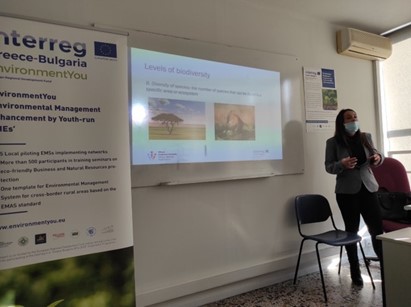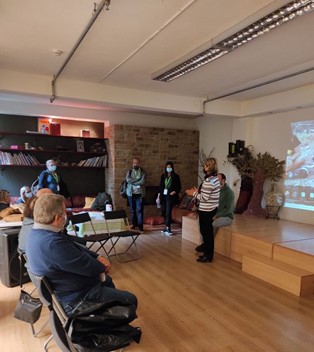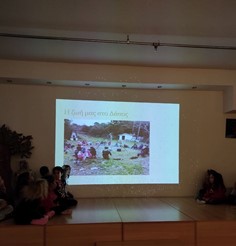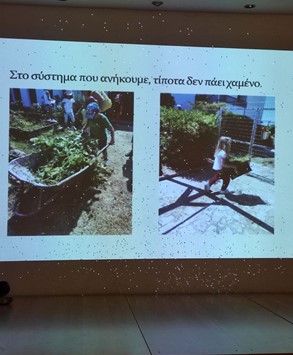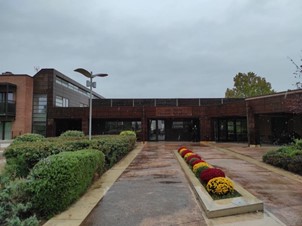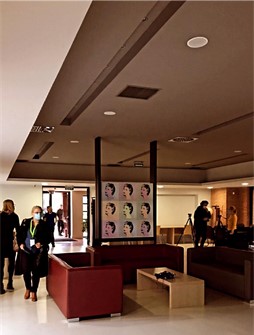More than 30 experts and young entrepreneurs in agriculture from Greece and Bulgaria took part in the international exchange - representatives of the partner organizations of the project: Hellenic National Youth Council, Agricultural University-Plovdiv, Regional Development Fund of Central Macedonia, Youth Forum 21st Century Association, Euroregion Nestos Mesta, Regional Center for Vocational Education and Training to the Chamber of Commerce and Industry - Blagoevgrad and the Association for Regional Social and Economic Development.
The educational process included workshops and face-to-face visits to local primary, secondary and tertiary education institutions but also to small and medium-sized enterprises that emphasize in the Agri-food Sector.
The aim of the Greek and Bulgarian partners visit was the promotion of interaction between all participants and the enhancing of cooperation between the beneficiaries. The specific objectives of the Study Visit in Thessaloniki were the theoretical reinforcement of the experiential method through the interconnection of theory with practical application, the active and participatory learning process, the familiarity with the use of "good" practices, the understanding of environmental and economic benefits and the revision of misconceptions and the application of the newly formed theory in practice.
On the first day of the study visit the organizers welcomed the participants and they had the opportunity to have some social activities for ice-breaking before the welcome dinner starts and an introduction to the study visit schedule happens.
The educational process started on the second day with the first workshop presented by the Environmental Consultant and Youth Entrepreneur, Panagiota Kessanidou. The workshop included the presentation of Eco – friendly Business and Environmental Management Systems. After the lunch break, the Agronomist and Trainer Efthimiadou Evgenia spoke, who conducted the following workshops on the Protection of Natural Resources through Business Activities and Bio-agriculture mainly in the Mountainous Area. At the end of each workshop, participants had the opportunity to discuss with the two experts.
The third day of the study visit was the “Field Trip Day” where the face-to-face visits took place. The visits started with the transfer of participants to the village of Trilofos where the “School of Nature” is. Τhe school principal welcomed the participants and she made an introduction to the school history and to the innovative educational methods they apply. In the "School of Nature" the dominant idea is that the child builds knowledge in nature, where he develops sensually, mentally, emotionally and spiritually playing with the soil, climbing trees, walking in the plowed fields, experiencing the rain, the wind, gazing at the mountains and clouds, observing and caring for the animals and the school garden. They chose nature as an educational environment, as man was created to learn through nature, because there the purest and most vivid thought is born, in it the child thinks vividly, experiences the joy and pleasure offered by the acquisition of knowledge.
The highlight of the visit was the kids of Ms. Dimitra’s class who presented the basic and most important activities of the every day schedule and they shared the principles and the values gained through their experience in the “School of Nature”. At the end of the visit, the participants had the opportunity to taste some of the delicious pies and cakes cooked by the students with the help of their teachers. All the products that used for preparing the food, are produced in the school’s gardens by the kids.
The third day continued with the visit to the American Farm School. The American Farm School nurtures the minds that feed the world. It is the premier institution in southeastern Europe for education and research in agriculture, food systems, environmental studies and other life sciences related to our sustainable future. Founded in 1904 by enlightened American educators, the School continues to apply its hallmark “learn by doing” approach to educate students of all ages. Divisions include the Elementary School of Environmental Education, Middle School, High School, Junior College and Perrotis College of Agriculture, Environment and Life Sciences. The School’s campus farm—producing premium milk, yogurt, Omega-3 eggs, turkeys, wine and more—serves as a living laboratory for hands-on education and applied research. The School’s extensive scholarship program provides promising young men and women with an unparalleled education that leads to productive careers and sustainable communities.
The third day ended with the visit to “Ergon Agora East” which is bringing to life the first-ever ‘grocerant‘ store in Greece, a hybrid food hall concept that combines a grocery and a restaurant. They are turning supermarket into an experiential destination with an emphasis on fresh and packaging free products along with a fire powered restaurant, an in-store bakery and a private dining area. Also, there is a seaside bar, an urban farming and an outdoor event space. By completing the tour in the store and the presentation of the history and the vision of the company, the participants were able to taste some of the most delicious creations of the restaurant.
The last day of the four-day study visit started with the Researcher & Senior Expert of the Institute of Bio-Economics & Agro-Technology at National Center for Research & Technological Development, Thanos Balafoutis and his colleagues who presented the Recent Scientific Trends in the agricultural sector and the Best Practices applied across Europe. The Agronomist and Trainer Efthimiadou Evgenia closed up the study visit with two interactive workshops about the path that erases food from the farm to fork and the food waste.


